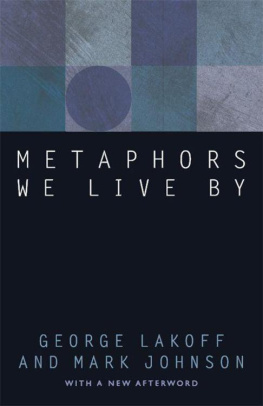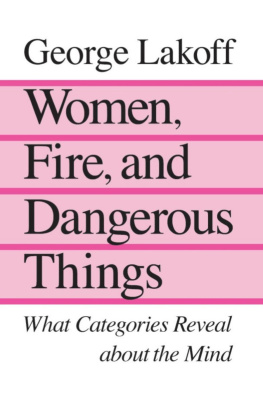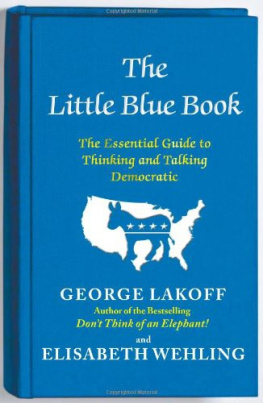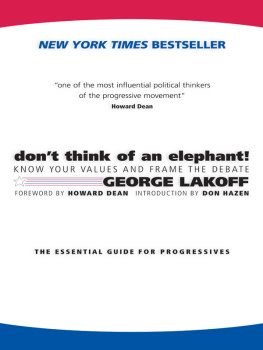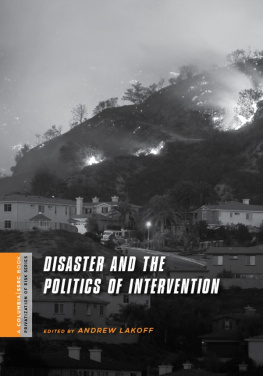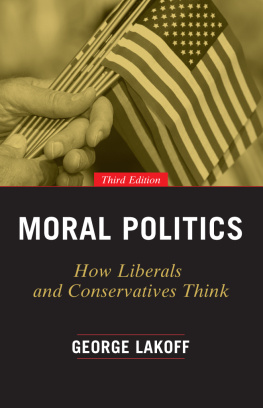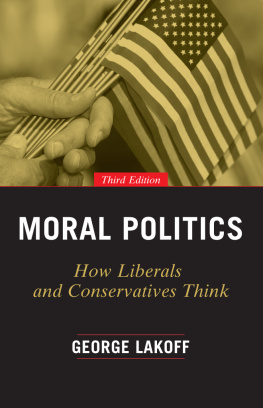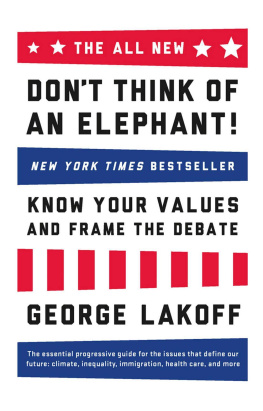George Lakoff - Moral Politics
Here you can read online George Lakoff - Moral Politics full text of the book (entire story) in english for free. Download pdf and epub, get meaning, cover and reviews about this ebook. year: 2016, publisher: University of Chicago Press, genre: Politics. Description of the work, (preface) as well as reviews are available. Best literature library LitArk.com created for fans of good reading and offers a wide selection of genres:
Romance novel
Science fiction
Adventure
Detective
Science
History
Home and family
Prose
Art
Politics
Computer
Non-fiction
Religion
Business
Children
Humor
Choose a favorite category and find really read worthwhile books. Enjoy immersion in the world of imagination, feel the emotions of the characters or learn something new for yourself, make an fascinating discovery.
- Book:Moral Politics
- Author:
- Publisher:University of Chicago Press
- Genre:
- Year:2016
- Rating:4 / 5
- Favourites:Add to favourites
- Your mark:
- 80
- 1
- 2
- 3
- 4
- 5
Moral Politics: summary, description and annotation
We offer to read an annotation, description, summary or preface (depends on what the author of the book "Moral Politics" wrote himself). If you haven't found the necessary information about the book — write in the comments, we will try to find it.
Moral Politics — read online for free the complete book (whole text) full work
Below is the text of the book, divided by pages. System saving the place of the last page read, allows you to conveniently read the book "Moral Politics" online for free, without having to search again every time where you left off. Put a bookmark, and you can go to the page where you finished reading at any time.
Font size:
Interval:
Bookmark:
HOW LIBERALS AND CONSERVATIVES THINK
Third Edition
GEORGE LAKOFF
THE UNIVERSITY OF CHICAGO PRESS
Chicago and London
The University of Chicago Press, Chicago 60637
The University of Chicago Press, Ltd., London
1996, 2002, 2016 by George Lakoff
All rights reserved. Published 2016.
Printed in the United States of America
25 24 23 22 21 20 19 18 17 16 1 2 3 4 5
ISBN-13: 978-0-226-41129-3 (paper)
ISBN-13: 978-0-226-41132-3 (e-book)
DOI: 10.7208/chicago/9780226411323.001.0001
Library of Congress Cataloging-in-Publication Data
Names: Lakoff, George, author.
Title: Moral politics : how liberals and conservatives think / George Lakoff.
Description: Third edition. | Chicago : The University of Chicago Press, 2016. | Includes bibliographical references and index.
Identifiers: LCCN 2016005827 | ISBN 9780226411293 (pbk. : alk. paper) | ISBN 9780226411323 (e-book)
Subjects: LCSH: United StatesMoral conditions. | Political ethicsUnited States. | Social ethicsUnited States. | Social valuesUnited States. | ConservatismUnited States. | LiberalismUnited States.
Classification: LCC HN90.M6 L34 2016 | DDC 306.0973dc23 LC record available at http://lccn.loc.gov/2016005827
 This paper meets the minimum requirements of ANSIS/NISO Z39.48-1992 (Permanence of Paper).
This paper meets the minimum requirements of ANSIS/NISO Z39.48-1992 (Permanence of Paper).
To My Wife
KATHLEEN FRUMKIN
and to the Memory of
PAUL BAUM
Preface to the Third Edition
Moral Politics is even more relevant today than it was when its first edition appeared in 1996. Conservatives and progressives have opposing worldviews at the level of basic moralitythey have conflicting understandings of what is right and wrong. The social and political divide in the U.S. is even stronger now than it was two decades ago. Accordingly, the need for a public understanding of the nature of that divide has grown enormously. And this is not only the case in the U.S. Similar divides have been fostered in many other countries, often supported by powerful conservative groups in the U.S.
The fundamental nature of the divide has not changed, although the world has changed enormously. The computer revolution has made cellphones and laptopsalong with internet access and social mediaubiquitous. The effects of global warming are also ubiquitous: massive storms and floods, droughts and fires, sea-level rise and water-shortages, mass migrations of fish and birds, as well as species extinction. Scary things have happened: the 9/11 attack; wars in Iraq and Afghanistan; the Syrian governments horrific attacks on its own people with the resulting flood of refugees throughout Europe and the rise of the horrific ISIL regime; the rise of China as an economic and military world power buying up land throughout the world; the rise of Putin and his rebuilding of the Russian military; the economic crash of 2008 and the ever-increasing wealth of the 1 percent along with the demise of the American middle class; and the Citizens United decision by the conservative Supreme Court pumping billions into the Republican election coffers and conservative causes at all levels.
One might have hoped that such massive changes might have brought people together, but the reverse has happened. The divisions between conservative and progressive values have become stronger and more virulent. They cry out for a public understanding. Hence, this new edition of Moral Politics.
What follows is the text of the second edition followed by a new afterword to bring it up to date. But some of what has been learned over two decades should be stated at the outset.
All Politics Is Moral
When a political leader proposes a policy, he or she assumes that the policy is right, not wrong or morally irrelevant.
Conservatives and progressives typically support opposite policies because they have opposite moral worldviewsopposite notions of right and wrong. Moral worldviews are important to people, part of their self-identity. People tend to think of themselves as good and moral, not taking into account that there could be an opposite view of what is moral.
Lists of Apparently Unrelated Issues
Progressives and conservatives often identify themselves via lists of positions on issues which they are for or against: legalized abortion; higher taxes on the rich; stopping and reversing global warming; increases in Social Security, Medicare, and other social safety nets; gun control; raising the minimum wage; gay marriage; equal pay for women; providing undocumented immigrants and their children with health care and public education; universal early childhood education; support for unions; and so on. There are scores of such issues. And, as we shall see, ones positions on them are not random or arbitrary; they generally follow from ones moral worldview. The bulk of this book shows how.
Conservatives usually have a smaller list of apparently unrelated general principles. They vary somewhat, but here is a typical short list: smaller government; free markets; personal responsibility; lower taxes; strong defense; traditional family values. Many conservative positions follow from these principles. But they are still a list and do not mention the general moral basis of conservative thought from which they all flow: Strict Father Morality.
What Is a Moderate?
A moderate conservative has mostly conservative views but progressive views on some issues that may vary from person to person. A moderate progressive is mostly progressive but has some conservative views on some issues.
Moderates of this kind are called bi-conceptuals, since they have two opposing worldviews at once applied to different issues, one worldview more strongly held or more widely applicable than the other.
Alternatively, a moderate progressive or conservative may be pragmatic, that is, willing to compromise to get as close as possible to his or her strongly held beliefs.
There Is No Middle
The metaphor of the Left versus the Right comes with a line between them, and the metaphorical line has a middle. There are moderates like those above but not one worldview of the Moderate shared by all moderates. In short, there is no single middle defined by single worldview.
Neural Politics
All thought is physical, carried out by neural circuitry. No thought just floats in midair. Research over the past four decades has provided insight into how neural circuitry carries out thought that is below the level of consciousness.
Most Thought Is Unconscious
Only a tiny amount of our thought is conscious. A typical estimate is about 2 percent, with about 98 percent of thought unconscious.
Moral worldviews, like most deep ways of understanding the world, are typically unconscious. The more that a neural idea-circuit is used, the stronger it getsand may eventually become permanent, effectively hard-wired. Hence, most of what we will be discussing in this book occurs at the neural level and is likely to be unconscious.
Unconscious thought is studied in the field of cognitive science.
What If the Facts Dont Fit the Worldview?
We know from experiments that conscious perception is not immediate. To recognize a visual input, a sound, or a touch input you have to have in your brain neural circuitry that is able to recognize itthat fits it. What if your sense input doesnt fit what is in your brain? Your brain changes it, if possible, to make it fit.
Inputs from the senses presented to the eyes, ears, or touch take about one hundred milliseconds (a tenth of a second) before they can become conscious. That is so fast for conscious functioning that we dont notice any difference between the input to the senses and our conscious perception. But neurons fire on the scale of one millisecond (one thousandth of a second), and it take three to five milliseconds to fire again. It takes many neurons and a sequence of neural firings to take a sense input and turn it into a conscious perception. In that time, it is common for the visual, sound, or touch system to make a change, cancelling out part of what is present to the senses and creating a new input that fits the circuitry already in your brain.
Font size:
Interval:
Bookmark:
Similar books «Moral Politics»
Look at similar books to Moral Politics. We have selected literature similar in name and meaning in the hope of providing readers with more options to find new, interesting, not yet read works.
Discussion, reviews of the book Moral Politics and just readers' own opinions. Leave your comments, write what you think about the work, its meaning or the main characters. Specify what exactly you liked and what you didn't like, and why you think so.



